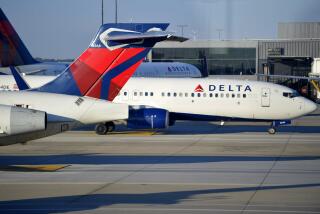Student Charged in Airline Threat
- Share via
BALTIMORE — Since the Sept. 11 attacks, federal regulators have spent billions of dollars to keep terrorists and other undesirables out of the sky, adding new baggage-screening workers, passenger-tracking procedures and other features to the nation’s air security system.
But what they apparently failed to stop, authorities acknowledged Monday, was a self-described concerned citizen with a point to prove.
In U.S. District Court in Baltimore, prosecutors alleged that Nathaniel Heatwole -- a ham radio enthusiast who once said pacifist beliefs had led him to refuse to register with the Selective Service System -- was behind a series of security breaches that prompted an emergency sweep last week of the nation’s air fleet for hidden weapons.
Since February, court documents allege, Heatwole has been planting plastic bags filled with box cutters and other banned items in lavatories aboard Southwest Airlines planes, in what he calls a campaign to show flaws in air security.
Two bags were discovered Thursday night, triggering the Transportation Security Administration to issue a system-wide search for weapons.
In the months since Sept. 11, other air travelers and consumer watchdogs have tried similar tests, often overcoming the nation’s newly strengthened air-traffic defenses.
Heatwole’s alleged attempts stood out, however, because he gave regulators a heads-up in a mid-September e-mail, which officials conceded they ignored.
Now, they are taking his case very seriously. On Monday, Heatwole was charged with a single count of violating a federal law against bringing a concealed, dangerous weapon aboard an airliner. Heatwole was released without bail; he faces up to 10 years in prison if convicted.
According to an affidavit by an FBI bomb specialist, Heatwole sent an e-mail to the TSA’s online consumer hotline on Sept. 15 that outlined six security breaches he had initiated between Feb. 7 and Sept. 14 at North Carolina’s Raleigh-Durham International Airport and Baltimore-Washington International Airport.
In four of the incidents, authorities allege, Heatwole stowed packages in planes’ rear lavatories that contained box cutters, matches, molding clay made to simulate a plastic explosive and eight ounces of liquid bleach.
On two other occasions, officials allege, he smuggled the contraband onto airplanes or past security but did not leave the items behind.
Two of the packages were found on Southwest planes on April 13 and April 14, and the remaining two were found last week on Southwest planes in New Orleans and Houston, officials said. A TSA spokeswoman said officials had opened an investigation into the April incidents at the time but that the investigation was inconclusive.
In his e-mail, Heatwole declared that he knew what he was doing was illegal. But he viewed his actions as “an act of civil disobedience with the aim of improving public safety for the air-traveling public,” said the affidavit, which was made public Monday.
Heatwole drew attention late last week after officials, using an electronic database, matched the nature of the most recent incidents with his earlier e-mail, which included identifying information.
Homeland Security officials said the case had prompted them to review their procedures for handling some of the thousands of e-mails they receive from the air-traveling public.
“This is not a good experience. This is a bad experience,” Homeland Security Secretary Tom Ridge said during a visit to Duke University. “But we may learn something about it that we can apply across the country.”
Ridge said officials “will go back and look at our protocol” for how such e-mails are handled. He said the agency gets a high volume of e-mails about possible threats, adding that the decision was made that Heatwole’s “wasn’t an imminent threat.”
Heatwole is a junior majoring in political science and physics at Guilford College, a small liberal-arts school founded by Quakers in Greensboro, N.C. Wearing sneakers, he appeared in court in Baltimore with his parents and his lawyer, Charles Leeper. They all declined to comment.
U.S. Magistrate Judge Susan Gauvey set a preliminary hearing for Nov. 10. The judge ordered Heatwole to stay off airplanes and not to have contact with weapons of any kind. Federal officials said they had found certain “mock weapons” at his parents’ home in Damascus, Md., but declined to elaborate.
At a news conference, federal prosecutors emphasized that they viewed the charges seriously.
“This was not a prank. This was not poor judgment. This was a crime,” said Thomas DiBiagio, the U.S. attorney for Maryland. “It was very foolish and dangerous.”
“I’d love to speak to all of this,” Heatwole told the News & Record of Greensboro, N.C., in an interview published Sunday. “I have a ton of stuff I’d like to say, but now is not the time. I have to work with the government before I work with the media.”
Last year, he told the Guilford campus newspaper, the Guilfordian, that when he turned 18, he sent his selective service registration form back to the federal government blank with a letter outlining his opposition to the draft.
In theory, the act could have resulted in a jail term of up to five years, but the government registered him despite his objections, he told the newspaper. He added that he thought of suing the government for registering him against his will but decided against it.
“I wanted to let them hear the voice of dissent,” he told the paper, “just in case they were listening.”
*
Shogren reported from Baltimore; Schmitt from Washington. Also contributing to this report were Times staff writers Chuck Neubauer and Shweta Govindarajan.
More to Read
Sign up for Essential California
The most important California stories and recommendations in your inbox every morning.
You may occasionally receive promotional content from the Los Angeles Times.













